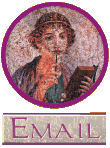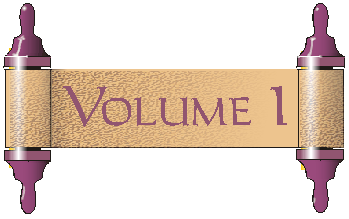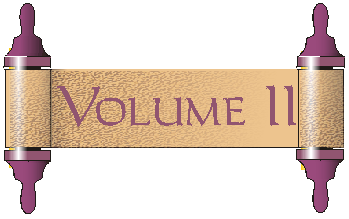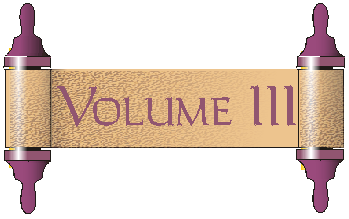



|
 |
VOLUME I |  |

Chapter 7
Yohanna climbed the path over the mountain, and there at the crest in the middle of a flock of sheep and goats, stood Yusef and David, tending three donkeys laden with packs. About them, a flock of sheep and goats milled aimlessly.
David came forward eagerly, and led Yohanna by the elbow.
“Go to Shechem at the foot of Mount Gerizim,” whispered Yusef to his son, “I have property there beside Yakob’s well, ceded to me by Herod.” He slipped a large pottery shard from his robe. “This is the deed of property under the care of my servant Manasseh and his wife, Maacah. It will not be easy for you, my son. Your neighbours will hate you, for the land was once theirs. Obey the Law and live as God wills it, and you will eventually earn respect from your neighbours.”
He pressed a large bag of gold and the shard into David’s hand. “Peace be with you, David.”
“And with you, Father.”
They hugged. Yusef patted his son’s back. “I love you.”
He held Yohanna and kissed her on the cheeks. “Peace be with you.”
“And with you, Yusef.” replied Yohanna.
Yusef touched baby Miriam with his forefinger. “Peace unto you, granddaughter,” he whispered to Miri, then looked into Yohanna’s eyes.
“Go!” he whispered, brushing away a tear from her cheek.
David took the reins of the lead donkey and lead the three animals with their precious cargo along the path. Yohanna and David turned for a last look at Yusef. He waved, and they waved back as they began their long journey along the road to Mount Gerizim.
![]()
The humble houses of the small town of Shechem stood in a jumble, leaning upon one another for support, their backs turned to the street. Fragrant fingers of cooking, of cumin and coriander, lamb stew and lentil soup, of incense and flowers drifted into the street from the courtyards and kitchens, mixed with the animal smell of sheep manure.
Children ran and laughed gaily, their game of tag winding through the streets of the small town. Their game stopped short as they reached the edge of the houses where the old men sat in the shade of the large pillars of the western gateway at the edge of the village. A thin mongrel barked at the children, his tail wagging and tongue dripping happily with foamy sweat, then barked again and one of the old men quieted him.
The dog stood at attention, staring into the wilderness beyond the village walls.
Suddenly, as if of one mind, the old men stopped their quiet discussion of the weather, crops and the nature of animals and God, and the children forgot their game, and huddled together clutching at each others clothing. Through the shimmering heat, a man, a woman, laden donkeys, and a small flock of sheep approached.
David and Yohanna were tired from their long journey. Their lips were dried and their throats parched. Shielding the bundled child from the sun by a covering cloth, Yohanna carried Miri in her arms. She and David walked side by side. David moved slightly ahead as they neared the gate. The little group stopped a few paces short of the gateway.
“My name is David of Arimathea, and I seek Manasseh.” announced David.
The ancient faces looked him up and down. Leaning heavily on a shepherd’s crook, an old man creaked to his feet, and shuffled forward.
“Manasseh?” The old man squinted against the sun at David, “and what business do you wish to discuss with this Manasseh?”
“It is a matter between he and I,” answered David. “I wish to know where he lives.”
“You are a Judean!” said the old man. The statement rang more of an accusation.
“I am what I am!” answered David.
“And I am here,” answered the old man, a slight smile crossing his face.
David narrowed his eyes. “Manasseh?” he asked doubtfully.
The old man broke into a full blown ear to ear grin, “Master David!” he cried gleefully, “Has it been so long that you no longer recognize your Manny? I, who taught you to shear your first sheep, I who guided your first footsteps? How soon we forget!”
“Manasseh!” cried David, “A thousand pardons old friend! My eyes are blinded by your radiance! How could you be any other?”
The two men hugged each other and kissed, and the people around them beamed at them and each other. A peaceful meeting was preferable to a disputation, and a joyful reunion, best of all.
David broke free of the embrace, and held out his hand to Yohanna. She stepped forward.
“My wife, Yohanna,” announced David.
“A fine young woman!” declared Manasseh, “My wife Maacah will be delighted by your presence! And yours too, David!”
The newcomers were surrounded now by a crowd of villagers. Manasseh peered at the bundle in Yohanna’s arms. “You have a child?”
A brief look of fear passed between Yohanna and David, and Manasseh noticed it.
“Yes!” said David quickly, “A girl. Baby Miriam!”
Manasseh pulled back the covers. Miri slept peacefully in her cloth nest. As his eyes lighted on the crescent on the baby’s forehead, he glanced at one of his cronies nearby. Both men had seen the crescent. He quickly covered the child, and said nothing. There was a moment of all knowing in the group. The crescent was in all their thoughts, and they all understood its meaning. The crown of Ishtar.
It was the first sign of the Messiah. They all would be waiting now for the second sign: the star that was the central jewel of the crown. Only David was unaware of the true meaning of the mark, although he knew the infant was special in ways that a normal child was not.
“Come, you must be tired!” Manasseh said, “Today we shall sacrifice our best goat in your honour!”
“You are too kind, Manasseh!” protested David, “Take one of my flock!”
“Not at all, Master! My flock is your flock! Have you forgotten?”
“No!” replied David, “Of course not. Very well, we shall feast. But I insist on providing the meat for the ritual. Am I not the host?”
“Master,” replied Manasseh in acquiescence.
News of the arrival of the son of the owner of the house of Manasseh spread quickly. David, Yohanna and Manasseh travelled with a impromptu procession of villagers. Heads bobbed in and out of the doors and gates along the main street as they passed by.
Maacah stood in the doorway of the large gate to the compound of David’s house, smiling and wiping her hands with her apron.
“Master David!” she cried in delight as the group approached. David reached forward and kissed Maacah on her cheek. She was extremely spry for such an ancient woman, unbent by years of toil and undaunted by a lifetime of ordeal and hardship, her spirit strengthened by her trials. She reached toward Yohanna.
“You have the child?” she asked.
Yohanna raised an eyebrow at David and stepped forward.
“Here she is,” Yohanna said quietly.
As the two women met in the street and admired the baby, the courtyard gate was opened wide and the animals herded through the gate into the courtyard. The crowd of villagers carrying baskets and furniture poured into the courtyard between the large house and it’s outbuildings. A feast was to be prepared, a fitting new welcome for the new landowners.
In the midst of the excitement, a small circle of women formed around Yohanna and her baby sister Miriam. Their bodies and faces turned inward, radiating admiration, peace, contentment, joy, excitement, fear and protection, shielding the child from the boisterous activity whirling about them. Behind each word of praise, the critical eye of the mothers and potential mothers among them searched the child’s features for flaws and found none. Satisfied at the excellence of the creation, they gravitated as a group to the large outdoor oven and stone grain mills in the courtyard.
Manasseh slipped his hand into the crook of David’s arm, and led him through the gate to the stockyard.
“She is a handsome woman, Master David.“ as they passed Yohanna within a circle of women, “You have made a great choice.”
David smiled. “Father had said the town would not welcome me, but I have never seen such hospitality! Are all Samaritans this friendly or has some angel cast a spell blessing upon these people?”
“It is the child, Master. You have seen the mark on her forehead? They have seen it. We all know the significance of that mark, the Crown of Ishtar. They are a-buzz with excitement at the thought the End of Times is approaching! For some it is tempered with silent envy that their own daughter had not been chosen, accelerated for others with the hope of marriage for their sons to the chosen child.”
“I don’t understand, Manasseh,” replied David.
Manasseh lifted a bundle of straw into the feeding manger, and spread it out for the new flock.
“It is the child of the prophecy. The crown of Ishtar is the first sign of the coming of the Messiah. The woman within this child will choose the new king of Israel, the Messiah!.”
Manasseh pointed at the women preparing food for the banquet.
“Look, already romantic intrigue has taken hold of the women who know. They are thinking: How can I convince my husband to arrange a marriage? Who will the child favour as she grows? What gifts should I offer to bring the marriage to fruition? How can I serve the child to obtain her favour as she grows to maturity?’
“Listen to me, David! Although a scattering of worship of Yahweh exists here in Sychar, their true allegiance is to El, the God of the Northern Israelites, the Supreme Ruler of the Canaanite Pantheon, king of their ancestors, consort to Astarte. In open sacrifice, the smoke of their holocaust at the temple is sent aloft with an unspoken prayer to the old gods. In secret rites, they still sacrifice to the old gods, openly, when they feel safe in the numbers of their town. At the Spring Solstice, they call for the blessing of Ba’al Aliyan and Rabbat Anat from the four corners of their field. Blood is spilled on the earth in old rites masked as simple superstition so as not to raise the ire of the Yahwist religious rulers of Samaria. They have only changed the name of their God to appease the Levites in Yerushalem.’
He pointed at the mountain rising south of them.
“See, towering above the village, Mount Gerizim. It reminds them every moment of every day that the seeds of their belief cannot flower beneath the heels of the legacy of the Hasmoneans. Daily, they struggle still under the shadow of the Hammer of the Maccabees. At the summit, unseen from the town, is a ruined temple! Its ancient glory is still burned into the minds of the inhabitants of Shechem. The ruined temple, Tel Urras, was levelled by the forces of Jonathan Hyrcanus a century before Herod took the throne of Judea. Although the temple had been sacked and looted of its treasures, they all know the true ark of Moses has escaped the destruction and still lies buried somewhere in the heart of Gerizim!”
“The ark of the covenant is here?”
“So they say, Master. Not only the ark, but relics of Moses himself!”
David stared open-mouthed at the face of Gerizim.
“The very walls and houses of the village stand beside the ruins of the old city, Kurbat Shechem,” continued Manasseh, “Reminders of days of glory and great wealth are scattered between the humble sheepfolds and houses. Now, this is a small backwater. The ancestral memory of past greatness, the intense pressure subverted religious fervour seethes beneath the seeming banality and quietness of small village life. The faith of Yahweh is imposed by the fear of repression directed by outsiders: Temple spies, the Herodian secret police, and the cohorts of Imperial Rome.”
“But there are worshippers of the Lord here, are there not?”
Manasseh nodded. “There are some. Your neighbour Silas is an unrepentant Yahwist. He fancies himself the sole protector of the legacy of the prophets in the village and he rails against the idolaters. If your woman is as strong-willed as I think she appears to be, you had best have the wisdom and patience of Solomon to keep them from each other’s throats!”
David laughed.
“It is no laughing matter, young Master!” Mannaseh said fiercely. “Do not turn your back even for a moment to your neighbour Elias, for he will take that moment to slip a blade between your ribs! He is a man full of hate, even though he professes to be a holy man! He will turn you in to Herod’s men even though he hates Herod as much as the next man!
“This town is balanced precariously between the new and the old. One day I think the will of Yahweh will prevail, I hope despite of Elias not because of him, but until it does, you must be as a hunter in a nest of vipers. All conspire against any outsider entering our tiny town. Yahwists and Canaanites alike are greeted by suspicion. And outright hostility. Every stranger presents a potential betrayal: the death of one or even many of their own. So, all keep their beliefs to themselves. The sharing, the open hospitality which comes naturally to the people is repressed from fear. There is no inn here for the wayfarer, and the village gate is as far as most strangers may travel securely.’
“And the sign, the mark on the child’s head, the crescent moon, the crown of Ishtar, is the key which opened the hearts of the villagers to you. The townspeople, or most of them, welcome you with glad hearts. The Messiah, our liberator will soon appear. A new Joshua will appear, Yeshuah Bar Kokbah. A new prophet will soon be revealed through the child’s choice of a husband and break free the yoke of oppression which bends our necks. We will be free!’
Manasseh's eyes glowed with fire.
“We will be free!”
![]()

